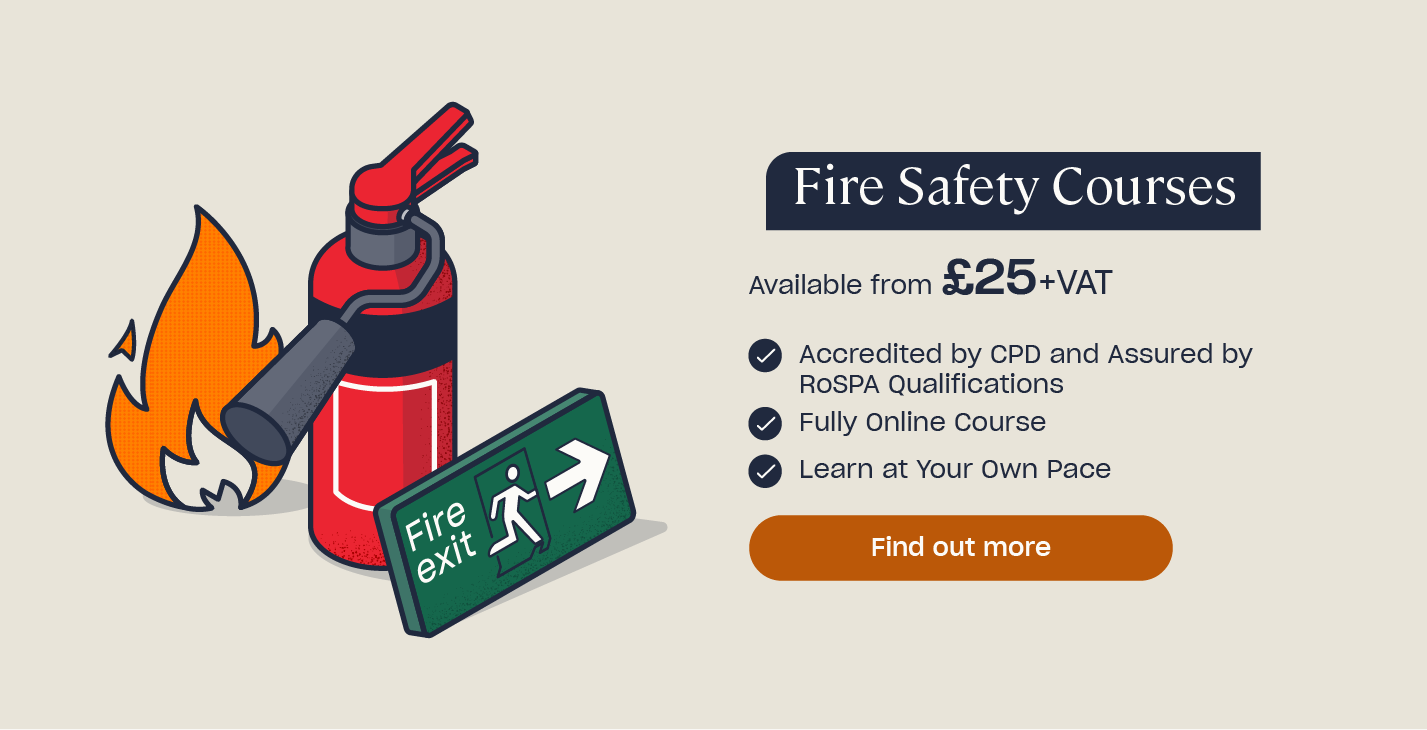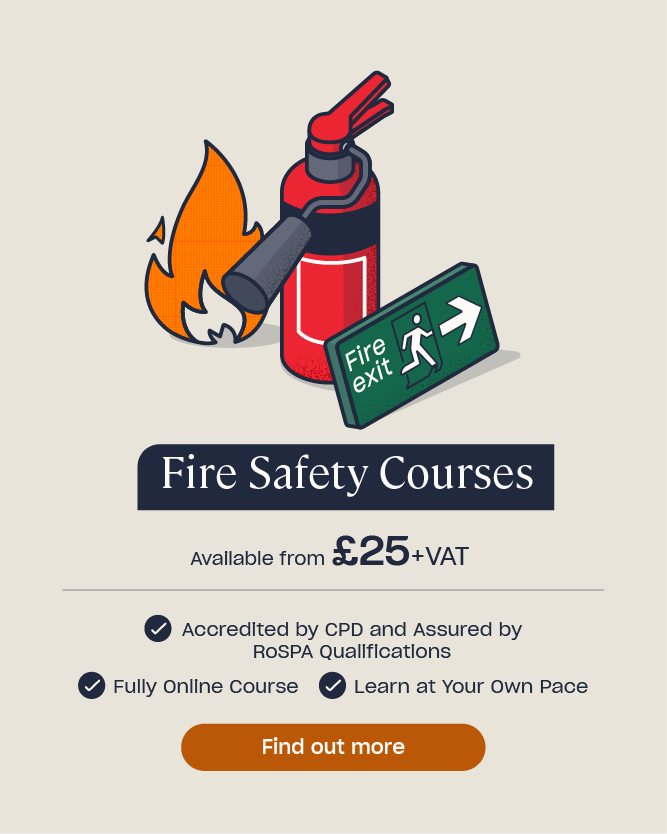Fire Safety Tips for Christmas
It’s a fact that feelings of joy and excitement reach an all-time high around Christmas. Is there anything better than getting cosy in a blanket with candles, baubles, and fairy lights twinkling around you? Sadly, the chances of an accident happening also increase with the festive abundance of electricals and flames.
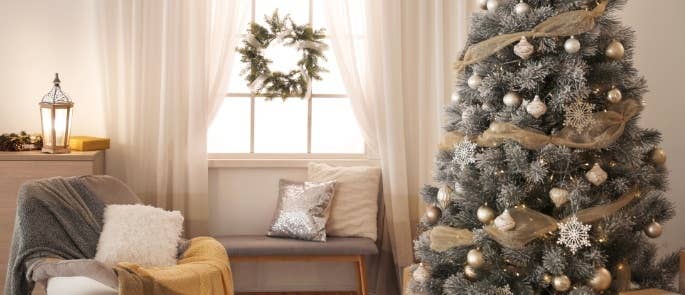
Every year, faulty appliances and leads, misuse of equipment and appliances, and placing items too close to heat are the leading causes of fires. These are easy mistakes to make when you’re focused on making your home look as Christmassy as the McCallister’s.
While it is top priority to have a fun and memorable time at Christmas, everyone should be extra careful to not let festivity become dangerous. The good news is that caution is easy to adopt and won’t be intrusive to your holidays.
We provide some simple Christmas safety tips throughout this article, which will help you keep your festive time free of fire risks.
Christmas Fire Safety Tips
The key areas you should consider during Christmas are decorations, lights, Christmas trees, and cooking. These are all staples in the Christmas holidays – you’re not expected to become a Grinch and ditch them. However, there are some simple steps you should take to prevent associated fire risks.
Deck your walls and mantelpieces sensibly.
Garlands, tinsel, lights, and other festive hangings are perfect for wrapping the whole room in Christmas. But these could all be the origin of a fire and extra kindling if you place them too precariously.
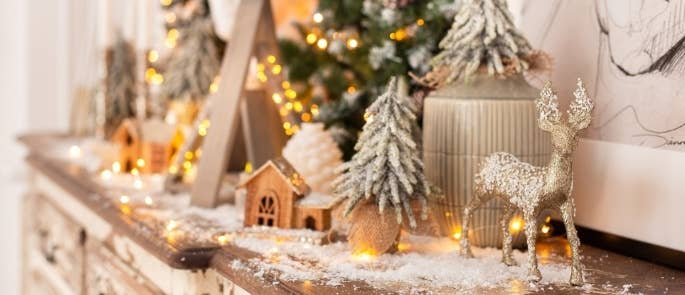
You should therefore think carefully about where you put everything:
- Avoid hanging decorations near candles, fireplaces, Christmas lights, radiators, and heaters. Your garland may look like it’s well above the fireplace, but it could accidentally fall down or an ember could latch onto it, causing a fire safety risk.
- When you do decorate above or around these areas, use ornaments that won’t catch fire easily.
- You should also minimise decorations in the kitchen. Getting your festive spirit as well as your apron on does make cooking around the holidays a wonderful experience, but be sensible. Keep decorations well away from hobs.
Look at the condition and standards of your lights.
Using the same lights year on year? You might not notice that the wires are old and fraying, which could be a fire waiting to happen. This is particularly true if you have to aggressively untangle them every Christmas, because last year you said it was a problem for future you. Pulling and twisting puts strain on the components and could damage their integrity.
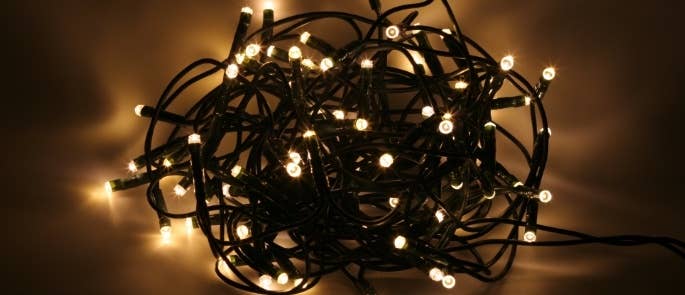
To ensure lights are safe for use, keep in mind the following:
- Electricals should have the British or European Safety mark on them. If yours don’t, make it a priority to buy some that do and recycle your old ones.
- Use LEDs instead of traditional filament Christmas lights. LEDs are lower voltage so generate much less heat.
- LED Christmas lights are estimated to last around 6 years when well looked after. Their components will naturally break down due to wear and tear, so keep a close eye on their integrity if you’ve had them for a while.
- Be careful not to overload outlets or extension leads. Overloading can cause overheating, which is just asking for a fire.
- Replace them if they show signs of a fault. Dodgy or flickering lights (unless they’re meant to be flickering) have got to go.
- You should use a residual current device (RCD) on outdoor lights. Using an RCD is important, as it’ll immediately switch off the power going to the electrical equipment if there is a fault. You can buy RCDs in DIY stores.
Turn off and unplug electricals when you’re not around.
It’s tempting to leave your lights on throughout the day so you can come back to a festive house, but you need to resist. It’s not wise to leave electronics like Christmas lights on when you’re at work or in bed. Aside from running up your electric bill, you run the risk of not being around to catch a fault.
Switch the electronics off at the wall sockets – not just on the extension lead if you use one – and then unplug them for complete safety. Even when switched off, some appliances can still draw power from the socket. Remember to switch off both indoor and outdoor lights if you have any.
Be careful when lighting and burning candles.
You no doubt already know to be cautious with candles, but it really is important to take extra care with fire safety around Christmas. A loose bit of tinsel or a blanket could easily catch the tip of a candle flame.
To use candles safely, keep in mind the following:
- Put your candles in areas where they won’t get knocked over or catch something, for example if someone passes by while putting on their coat and scarf.
- Keep them well away from decorations and the Christmas tree, and definitely don’t put them on the tree.
- Never leave them unattended. Even if you’re only popping out the room for 10 to 15 minutes, it’s really not worth it. You can fill your room with festive fragrances in safer ways when you’re not around, such as with reed diffusers or potpourri.
- When lighting candles, make sure you fully extinguish matches and put them away properly. Likewise, put lighters away after using them.
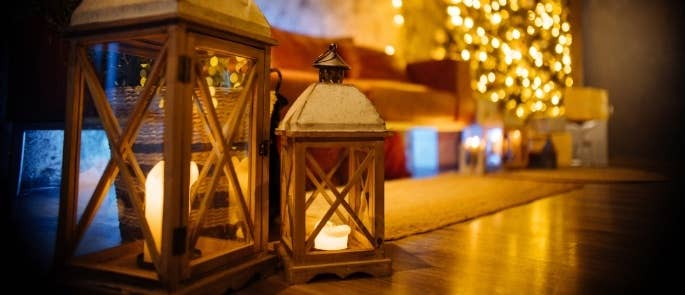
Select a suitable tree.
Everyone loves a real Christmas tree. That authentic pine scent really does fill the room with feelings of festivity. But an old, underwatered Christmas tree can pose a real fire safety hazard, so pay attention when picking and remember that it’s a live plant.
The fire service website provides advice on selecting a tree for Christmas:
- Choose one with vibrant green needles that are hard to pull off and that don’t break when you do so.
- The trunk should be sticky to the touch.
- If you bounce the tree trunk on the floor and a lot of needles fall off, the tree has been cut for too long and has likely dried out. You should choose another one.
Additionally, here are some tips for keeping your tree safe:
- Make sure you place it well away from any heat sources. You should also consider lowering the thermostat (as much as is comfortable). During winter, you’ll no doubt have the heating on every day in your home, which will contribute to your tree turning dry.
- Give it plenty of water. During winter, you’ll no doubt have the heating on every day in your home, which will contribute to your tree turning dry. The amount of water it needs depends on its size, so you should check its water levels every day if possible. A 6-inch tree could require up to a gallon of water every other day.
- If you have an artificial tree, you should still keep it away from heat sources and consider it a major source of kindling. Some artificial trees may have a ‘flame retardant’ label, but this doesn’t mean they’re fire proof.
- Only use lights on your real or artificial tree that conform to British Standards (which you can identify by the British safety kitemark) or have the CE Safety Standard mark. Remember to use LEDs over filament lights.
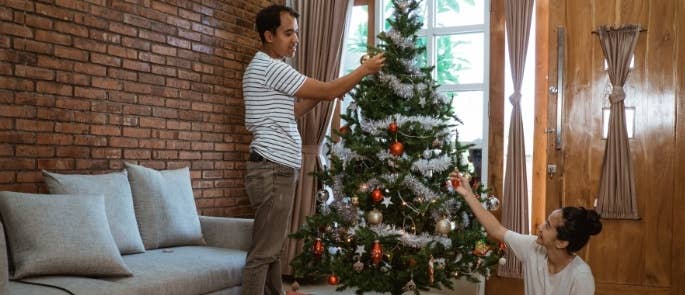
Keep your head on straight while cooking.
When you’re preparing Christmas dinner and other meals during the holiday, be mindful that you’re working with heat and fire. It’s easy to find yourself buzzing in and out of the kitchen when you have family and friends over, but this could lead to you putting an oven glove or towel down just a bit too close to the hob.
To ensure you prepare food safely at Christmas and avoid fire risks, keep in mind the following:
- Focus on what you’re doing – avoid rushing around and take plenty of deep breaths to prevent yourself from flustering. Your chef’s hat is on, so it’s natural that you won’t be a part of every conversation or be able to drop what you’re doing to answer every request.
- Save the drinking for after you’re done cooking. You want to keep your head clear and movements focused to avoid any accidents.
- Remember to turn everything off once you’ve finished. That rush of relief and eagerness to serve up food could lead to you forgetting to turn off the hob and oven.
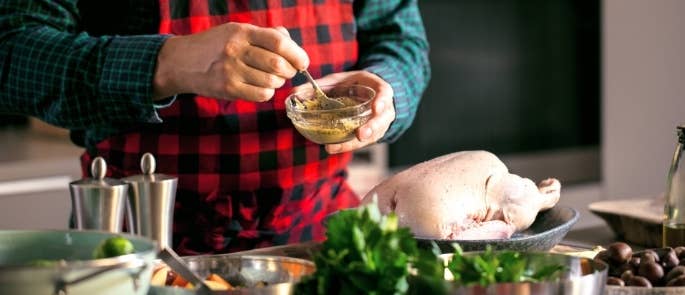
As a final tip, don’t be too fearful and have a fantastic time! As long as you are sensible during the holidays, there’s no reason why your Christmas shouldn’t be fire-proof. Safety measures don’t have to put a damper on the holiday by being taken too far, as they sometimes are. Some precautionary steps will give you peace of mind and a Christmas that’s unforgettable for all the right reasons.
What to Read Next:
- 7 Times Christmas Health and Safety Was Taken Too Far
- How to Reduce Waste this Christmas: Tips and Advice
- Managing Your Mental Health at Christmas
- Christmas Food Safety Quiz
- Online Fire Safety Training Course


